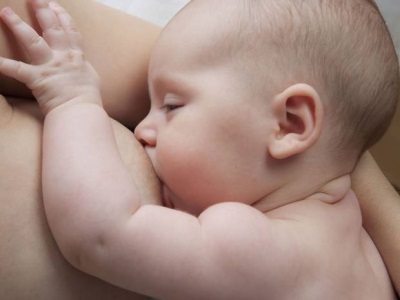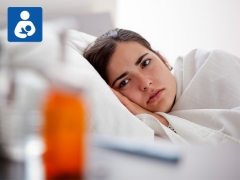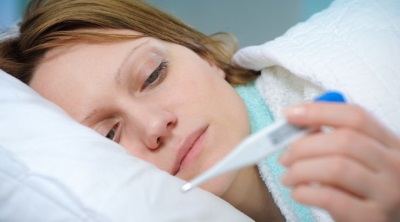Is it possible to feed breast milk at mom's temperature?
A cold during lactation always causes many questions for moms. Can I continue to breastfeed the baby? Is it acceptable to drink antipyretic? What if it's not a cold? Let's see why the nursing mom may have a fever and how it affects breast-feeding.
The reasons
All the causes that can cause fever in a nursing woman can be divided into three separate groups:
- Acute infectious diseases of viral nature.
- Acute diseases that caused bacteria.
- Exacerbations of chronic diseases.
It is very important to establish the cause, since tactics will differ in different cases. An increase in temperature in the first weeks of the postpartum period can be caused by the occurrence of inflammatory diseases, such as mastitis, inflammation of the stitches, endometritis and others.

How to measure the temperature?
If a nursing mommy measures the temperature during feeding or immediately after it (and also after decanting) under the arm, then indicators of 37.1-37.3 degrees or slightly higher will be considered normal. This is due to the formation of milk in the depth of the breast glands, as well as the release of heat by the breast muscle cells at the time of feeding. Therefore, it is advised to measure the temperature in the armpit approximately half an hour after feeding or decanting. Also, before measuring it is important to wipe the sweat, since water has a tendency to absorb heat and the presence of sweat in the armpit may make the result unreliable.
When to breastfeed?
When the cause of fever is a viral infection, feeding can not stop. First, the mother became a carrier of the virus even before the external manifestations of infection, so the virus could already enter the body crumbs. Secondly, after the virus enters the mother's body, the production of antibodies begins, which will be supplied to the infant with breast milk. This can prevent the disease in crumbs or make it easier to flow. In addition, the decision to stop breastfeeding due to fever can harm the female breast, causing stagnation and mastitis.
When can not?
Contraindications to the continuation of breastfeeding may be associated with:
- The risk of contact with the infant pathogen or toxins emitted by it.
- The need to use medicines that are contraindicated or undesirable for young children.
Appointment of antibiotics is not always the reason to stop breastfeeding the baby, but it happens that the mother has to take exactly those types of antibiotics that can damage the baby’s body. In this case, the woman is recommended to temporarily refuse breastfeeding.
If a woman has mastitis, the question of continuing breastfeeding should be decided individually. Mastitis is not an absolute contraindication, but most often infection with Staphylococcus aureus leads to its occurrence, and there is a high risk of an infant being infected with this microorganism.
In the case when the mother has worsened the existing chronic disease, for example, sinusitis, pyelonephritis or bronchitis, there are often no contraindications to the continuation of breastfeeding. Among all infections that occur in adults in a chronic form, only syphilis, active tuberculosis, viral hepatitis C and B, and HIV can act as an obstacle to breastfeeding.

Tips
A nursing mother with fever should contact a specialist to determine exactly the cause of fever. In addition, the doctor will recommend a treatment compatible with breastfeeding. If after childbirth has not yet passed six weeks, you should contact your obstetrician-gynecologist. In the event of symptoms of intestinal infection or cold, you must call the therapist's house.
In case of an acute viral infection, the mother should try to protect the infant from airborne infection. It is recommended to isolate the baby from the mother at least at the time of sleep, as well as often ventilate the room. When feeding a baby or caring for an infant, the sick mother should wear a disposable or gauze (4-layer) dressing, which should change every two to three hours.
Capacities with crushed chives of garlic can be placed around the baby’s crib, since the essential oils of this plant effectively act on various viruses. Also in the room where the mother and baby stay, you can turn on the germicidal lamp for 10-15 minutes four or five times a day.
A nursing mother should carefully read the annotations to her prescribed medications in order to know if the medications are in the milk. If possible, it is better to choose products with local action - ointments, inhalations, aerosol preparations, rinses. Very often, when the mother has an uncomplicated acute respiratory disease, herbal medicine is enough. However, there are herbs that are incompatible with breastfeeding, so the appointment of herbal teas should also be discussed with the doctor.
If the mother had to temporarily interrupt breastfeeding, but she wants to continue breastfeeding after recovery, she will have to decant regularly - every three hours during the day and every five hours at night.










